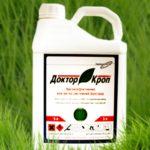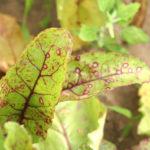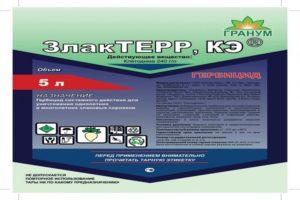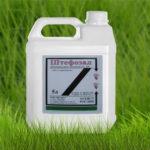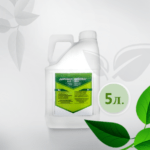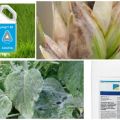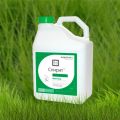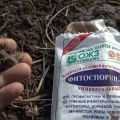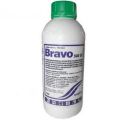Composition and manufacturer of fungicide Doctor Krop, instructions for use
The manufacturer of the fungicide "Doctor Krop" claims that it is an effective contact-systemic fungicide that protects agricultural plants from various pathologies. These include leaf spot, root rot, powdery mildew fungi. In order for the application of the product to give the desired results, it is recommended to strictly follow the instructions. Observance of precautionary measures is also important.
Composition and principle of action
The active ingredient is carbendazim. In 1 liter of the drug, there are 500 grams of the substance. It is considered a systemic fungicide and seed dressing agent. It is distinguished by its preventive and medicinal properties and protects crops from a number of diseases.
The active substance of the agent suppresses mitosis in the cells of animals, fungi and higher plants. In this case, the component does not affect the synthesis of DNA, however, it provokes damage, which is detected at subsequent stages of mitosis. As a result, there is a nondisjunction of chromatids that appeared after DNA duplication.
Appointment
The drug is used for the prevention and treatment of the following pathologies:
- different types of leaf spot;
- root rot;
- septoria;
- powdery mildew;
- helminthosporiosis.
Advantages and disadvantages
The advantages of the tool include the following:
- good control of many fungal pathologies in different climates - this is achieved through a successful formulation;
- the possibility of using for different crops - these include barley, beets, rapeseed, wheat, sunflower;
- protection against infectious pathologies that are located inside or on top of plants;
- immediate impact at an early stage and a long period of protection;
- the possibility of immediate entry of the active substance into the culture and redistribution in it - this helps to avoid infection from the outside and from the inside;
- preventive and therapeutic effect - it helps to stop the disease at the initial stage;
- lack of phytotoxicity - observed regardless of the stage of plant development;
- low hectare processing cost;
- possibility of using in tank mixes.
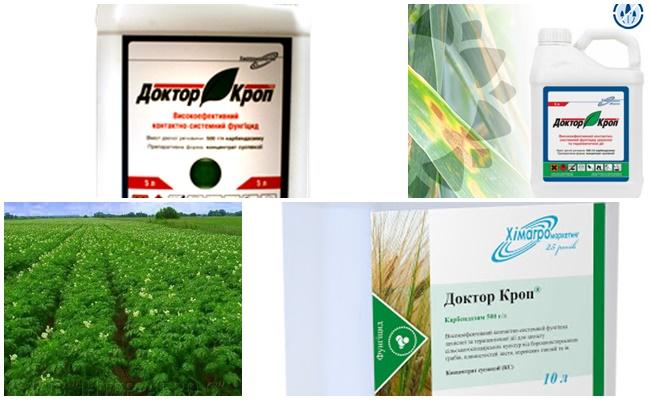
The tool has practically no drawbacks. The main disadvantages include the relatively high cost and the need to take precautions when using the substance.
Compatibility with other products
The product is compatible with almost all fungicides and insecticides that are used to protect cereals. It is permissible to combine it with micronutrient fertilizers.In this case, the pH of the water should be less than 10, the temperature - more than 10 degrees.
How to apply correctly
It is recommended to apply the fungicide before spraying. This should be done in warm, humid weather. It is in these conditions that fungi grow best. The tool can be used for prevention and treatment. In the case of using the substance, it is recommended to adhere to the following rules:
- The sprayer speed when using the composition should be no more than 7 kilometers per hour.
- When choosing the rate of the working solution, it is necessary to achieve a uniform hit on the crop. If the number of productive stems is higher, the minimum ejection rate should be 300 liters per hectare.
- The fungicide can be used in a tank mixture with other agents and fertilizers. However, it is important to evaluate their compatibility before using it.
- On cereals, the agent should be used from the beginning of the tillering stage to the phase of the second internode. It is recommended to apply the composition on sunflower 3 times. The first time this is done at the stage of appearance of 4-6 leaves, the second - after 2 weeks or at the stage of budding. Sugar beets are processed before fungal infections appear.
- It is recommended to spray plants in not the hottest weather. In this case, there should be no precipitation. The temperature should be + 15-25 degrees. At higher or lower settings, the product may work worse.
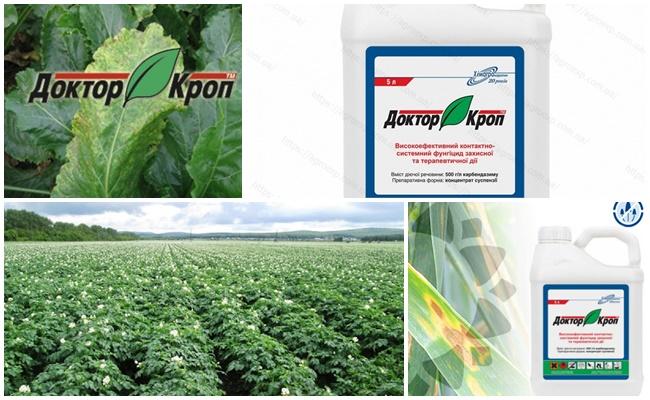
Under favorable conditions for the reproduction of bacteria, it is recommended to use Doctor Krop in a tank mix with other fungicidal preparations.
The application rates of the substance for different crops are given in the table:
| Culture | Consumption rate, liters per hectare | Spectrum of action |
| Sugar beet | 0,3-0,4 | Septoria, powdery mildew, cercospora |
| Spring barley | 0,5 | Septoria, root rot, helminthosporiosis, powdery mildew |
| Winter barley | 0,5 | Septoria, root rot, helminthosporiosis, powdery mildew |
| Spring wheat | 0,5 | Root rot, septoria, helminthosporiosis, powdery mildew |
| Rape | 0,4-0,6 | Septoria, Alternaria, Phomosis |
| Soy | 0,5 | Ascochitis, septoria, white rot |
| Rye | 0,5 | Root rot, helminthosporiosis, septoria, powdery mildew |
| Sunflower | 0,5-1 | Fomoz, white and gray rot |
| Winter wheat | 0,5 | Helminthosporium, root rot, powdery mildew |
For all of these crops, the product is recommended to be used during the growing season. For 1 hectare, 250-400 liters of working fluid is required.
Analogs
Substitutes include the following:
- "Shtefazol";
- "Derozal".
Reviews
Reviews confirm the effectiveness of this tool:
- Mikhail, 42 years old: “I use the fungicide Doctor Krop for powdery mildew. I like its effect very much. Literally after the first application, the symptoms of the disease disappear. At the same time, it is important to strictly adhere to the dosage. "
- Anna, 53 years old: “I have been using this drug for a long time to prevent fungal infections. I consider it one of the most effective. In order for the product to bring results and not harm health, it is important to carefully study the instructions before using it and strictly follow all the rules. "
Fungicide "Doctor Krop" is considered a fairly effective tool that helps to cope with most fungal infections. For plant treatment to be effective, it is important to follow the instructions.

